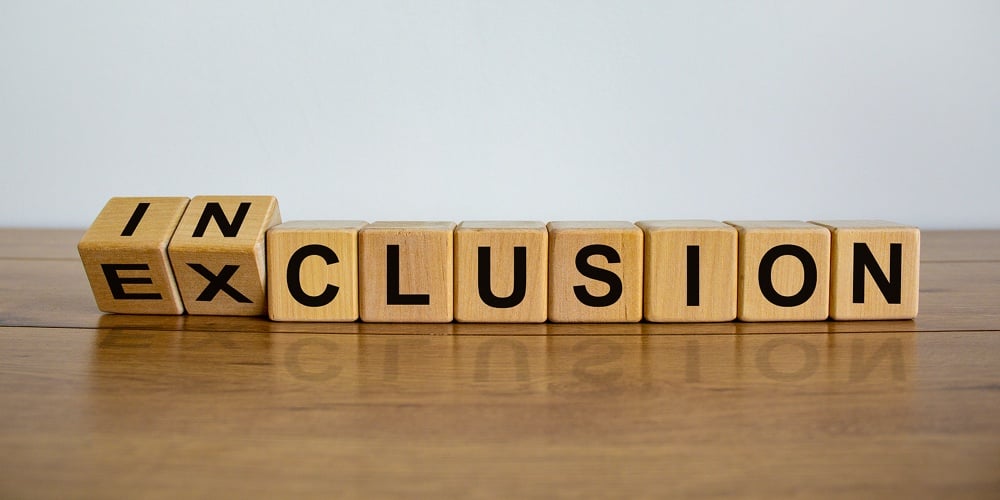Want inclusion? Stop cancel culture

Perfection should not be a prerequisite to anything in life. If we were required to already have achieved mastery before pursuing a new endeavor, growth would be impossible. How often though, in today’s cancel culture, is the message that someone’s mistake—or even their different perspective– is a reason to write them off as totally unworthy?
Cancel culture, as defined on Dictionary.com is an increasingly popular version of public shaming that involves withdrawing support for people and companies after they have done or said something considered objectionable or offensive. In very recent news, you may have seen the call to #CancelNetflix. Without making a case for either side of the debate over the film in question, what struck me was the number of people who advocated to #CancelNetflix based entirely on second- (or third-) hand information. Many acknowledged they had never seen any part of the film—including the trailer—but were still convicted in their position that Netflix was wrong to offer the film.
Sometimes cancel culture emerges over statements rather than actions, resulting in well-meaning people being ridiculed for saying the wrong thing. I first wrote about the need to be more forgiving of people’s missteps on their journey to inclusion in this article. It reflected on how Mitt Romney’s acknowledgement of a limited number of women in his own network would cause him to need outside support to create a gender-balanced cabinet. People mocked him for needing binders full of resumes gathered by people who worked for him, wondering why he did not have his own, already-established diverse network. Statistically speaking, most of the people who challenged his need for support were unlikely to have diversity in their own networks, but that did not stop people from pointing and laughing, possibly relieved that even though they didn’t know exactly how to achieve diverse teams, at least they knew better than to say that.
When people and organizations are called out for their mistakes, it hurts those ostracized and sends a message to others that if you cannot say the perfect thing, it is better to say nothing at all. In the aftermath of George Floyd’s murder, some executives were paralyzed by this fear. They wondered: Is it better to say nothing, hoping it may go unnoticed or to make a public statement and risk drawing attention to a leader’s discomfort with talking about race? Silence was not the right choice, but as some leaders escaped immediate public scrutiny while others did not, they may have felt relief over their decision to remain silent.
It is not surprising that when people believe punishment is on the other side of imperfection, they are more likely to choose silence over questions; ignorance over curiosity. They embrace colorblindness at the expense of not fully seeing others; avoid greeting someone by name rather than asking for correct pronunciation; take the stairs instead of navigating whether to offer assistance to a person using a wheelchair on the elevator. These choices may feel more comfortable in the moment, but they will not create inclusion, build more capable leaders, or be the change management foundation necessary to strategically integrate diversity, equity, and inclusion in the workplace.
To effectively manage an organization through that level of transformation, there must be comfort with growth and acknowledgement that in taking first steps, there will be stumbles, missteps, wrongly expressed sentiments. Some of these mistakes may be overcome by assuming good intent. Most of them can be worked through by personally connecting with the humans on both sides of an offense, partnering for growth, building empathy, and creating the safe space for candid conversations.
This space will allow errors to be an opportunity to open doors for bold, necessary conversations. It will let leaders admit what they don’t know, to show up ready to learn, and to be met where they are today.
This gracious space to grow is what it will take to move toward authentic inclusion, shifting people from a mindset of never saying the wrong thing (a focus on political correctness) to building deeper understanding and appreciation for the uniqueness of each human they encounter (a focus on genuine interactions). It is not a switch that can be flipped, but a journey of unlearning, learning, and then learning more. It will take organizational and individual actions; efforts for people to stop judging — and to stop fearing being judged—for any vulnerability they show, any mistake they make, any insensitivity they let slip.
It will mean leaving behind a cancel culture that threatens to cut off anyone who shows the need to grow and trading up for an environment that honors and respects each human in your organization. It will lead to the inclusive workplace that is more valuable for all.





